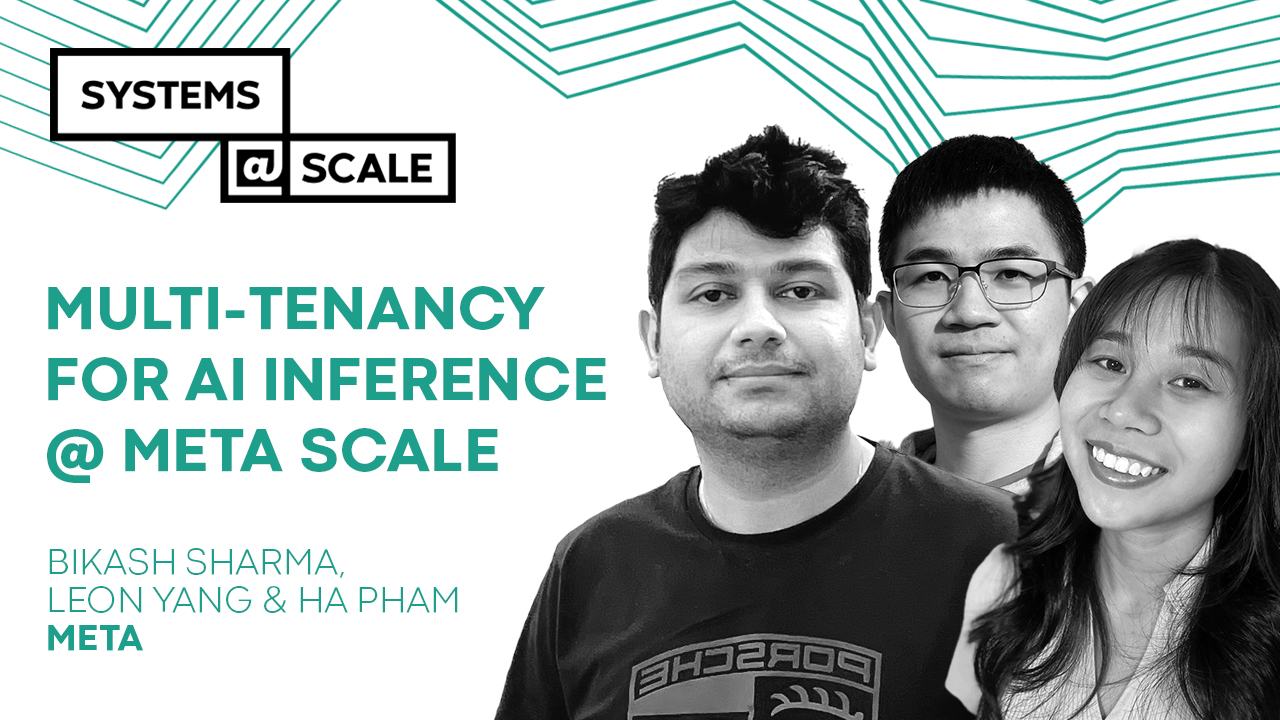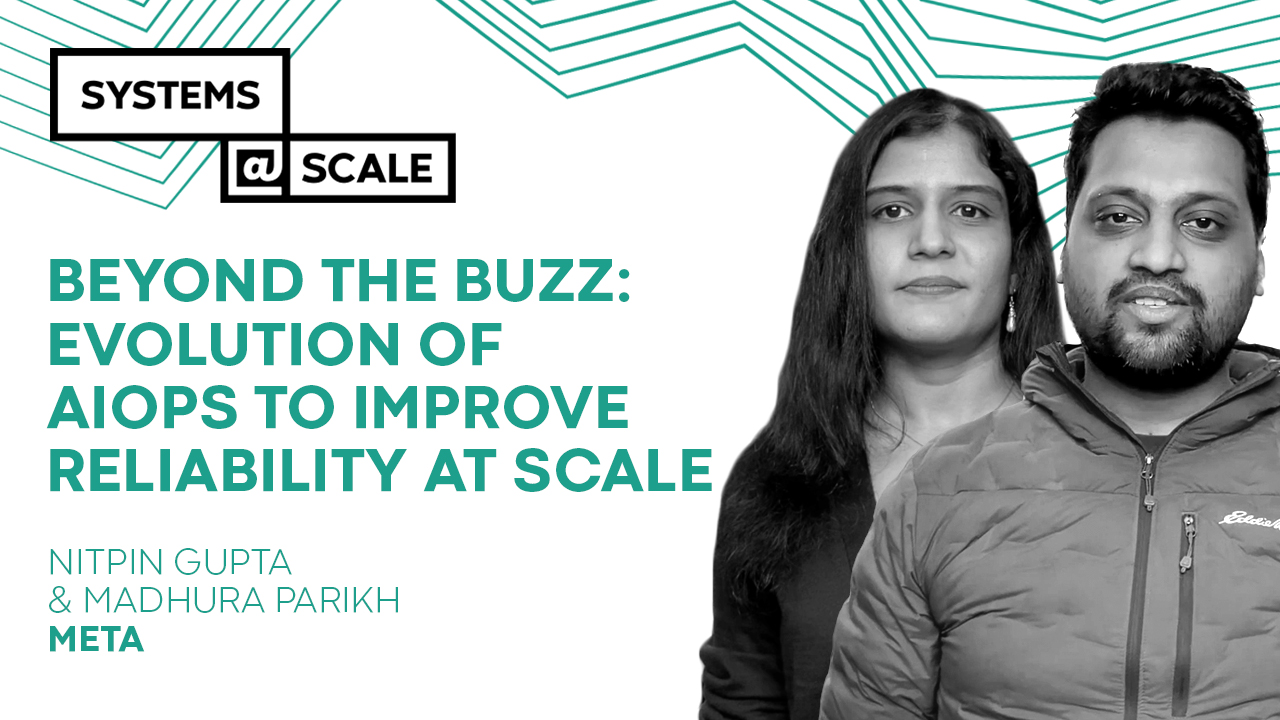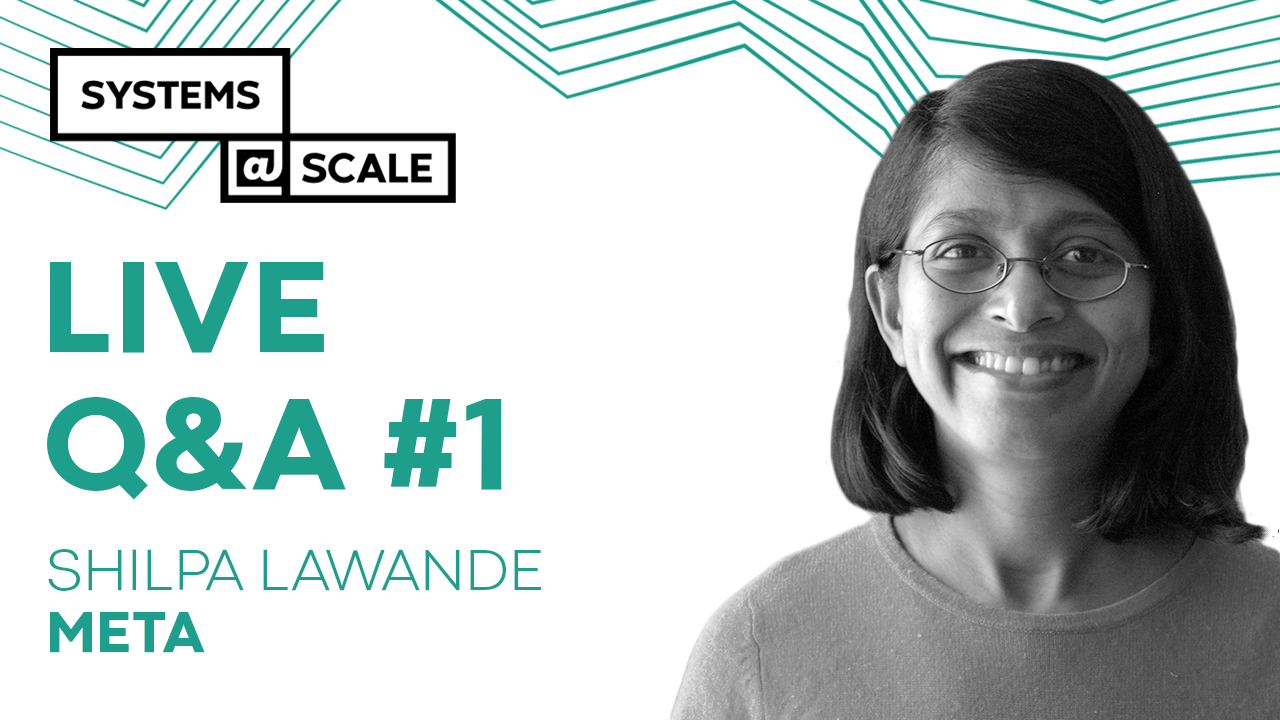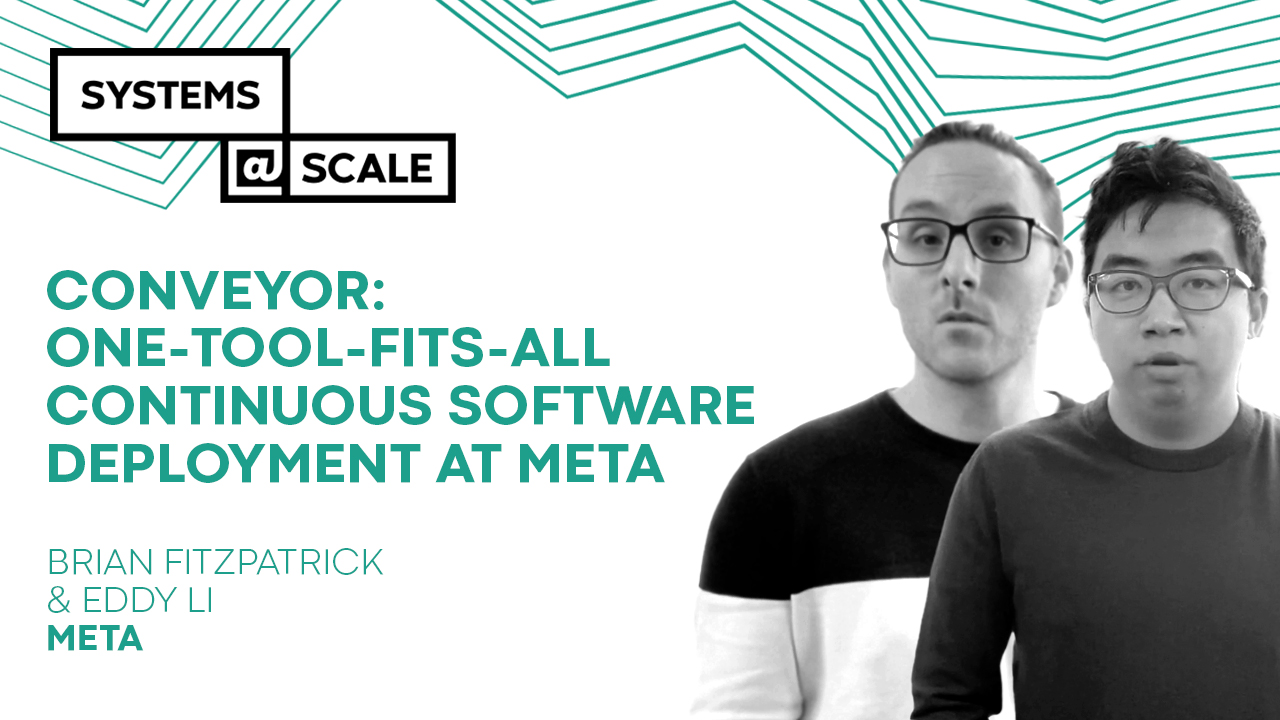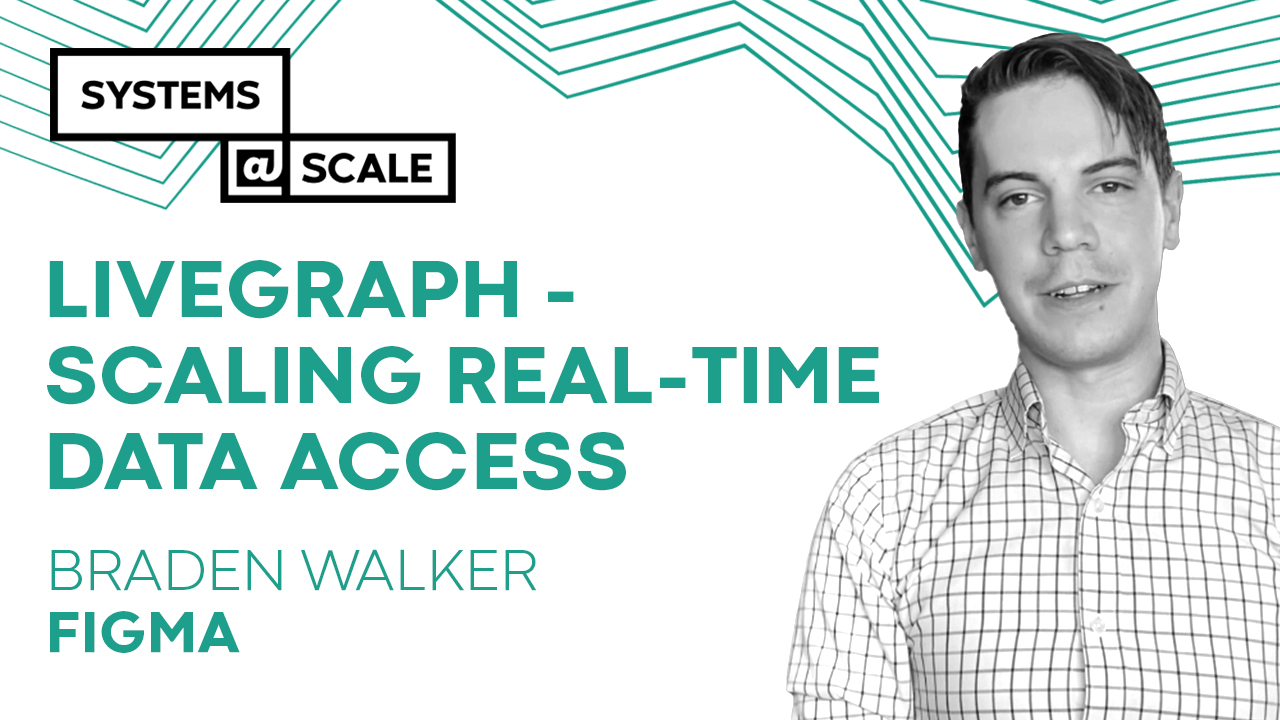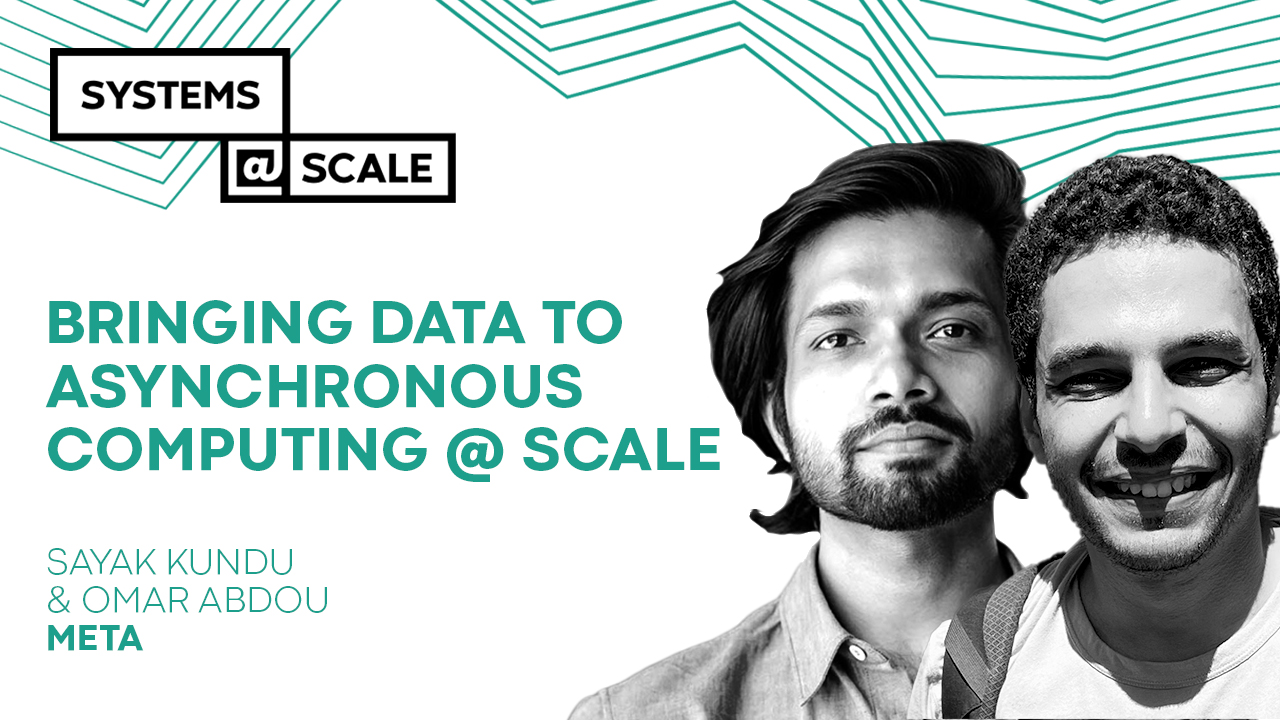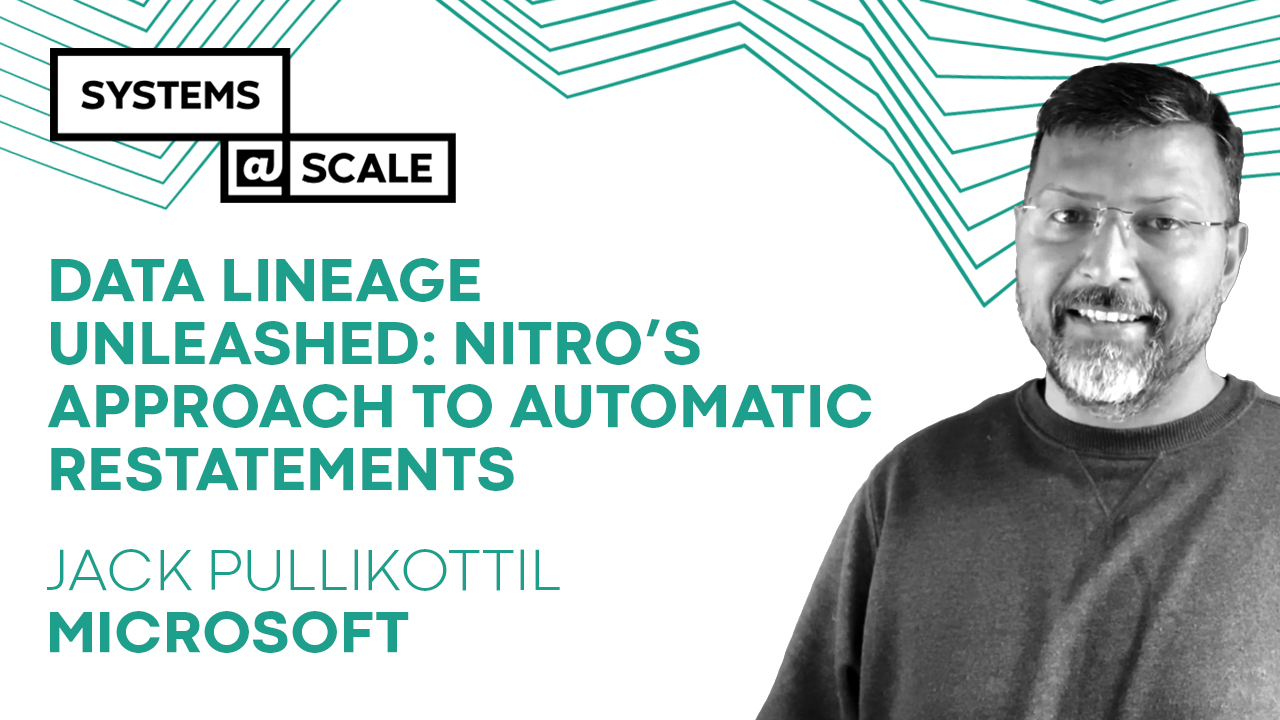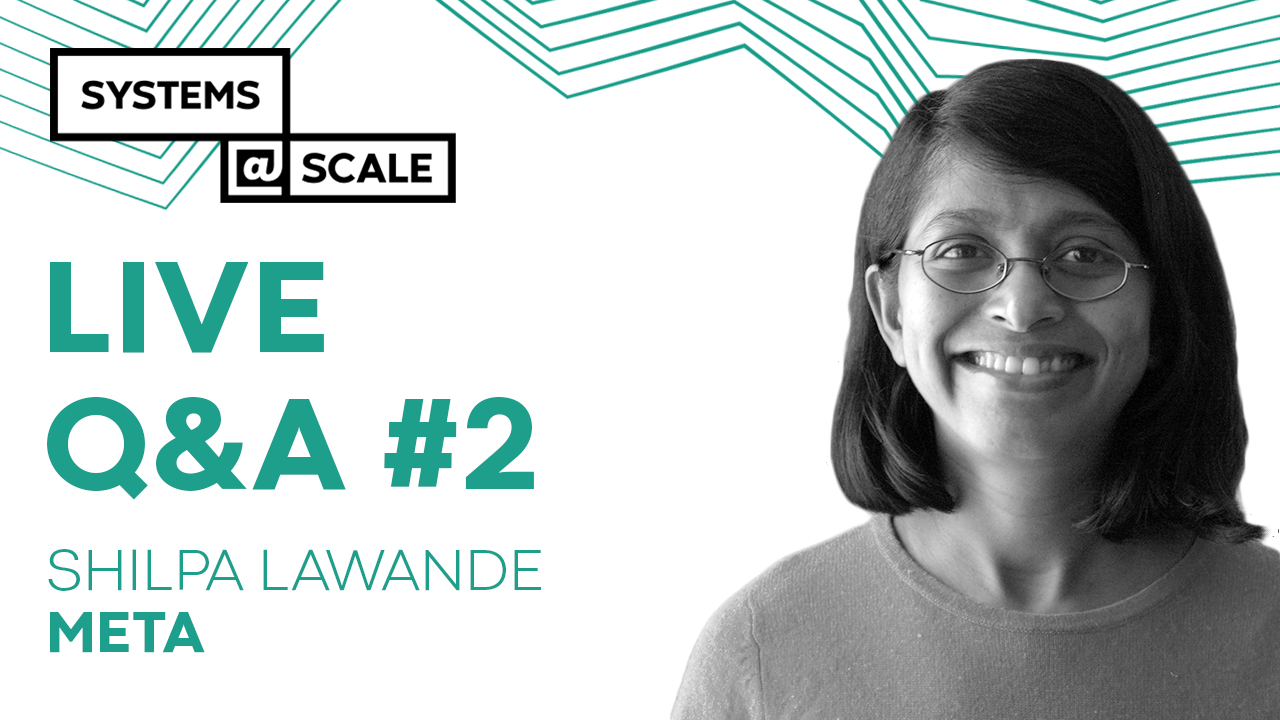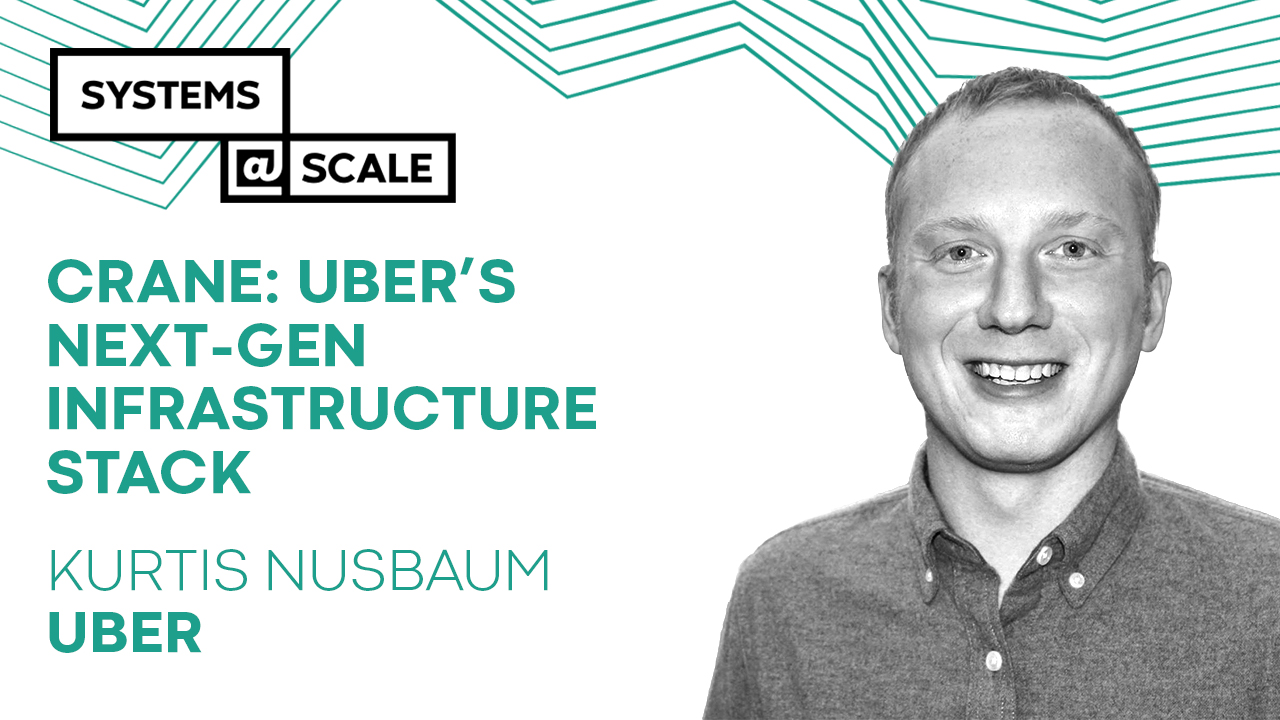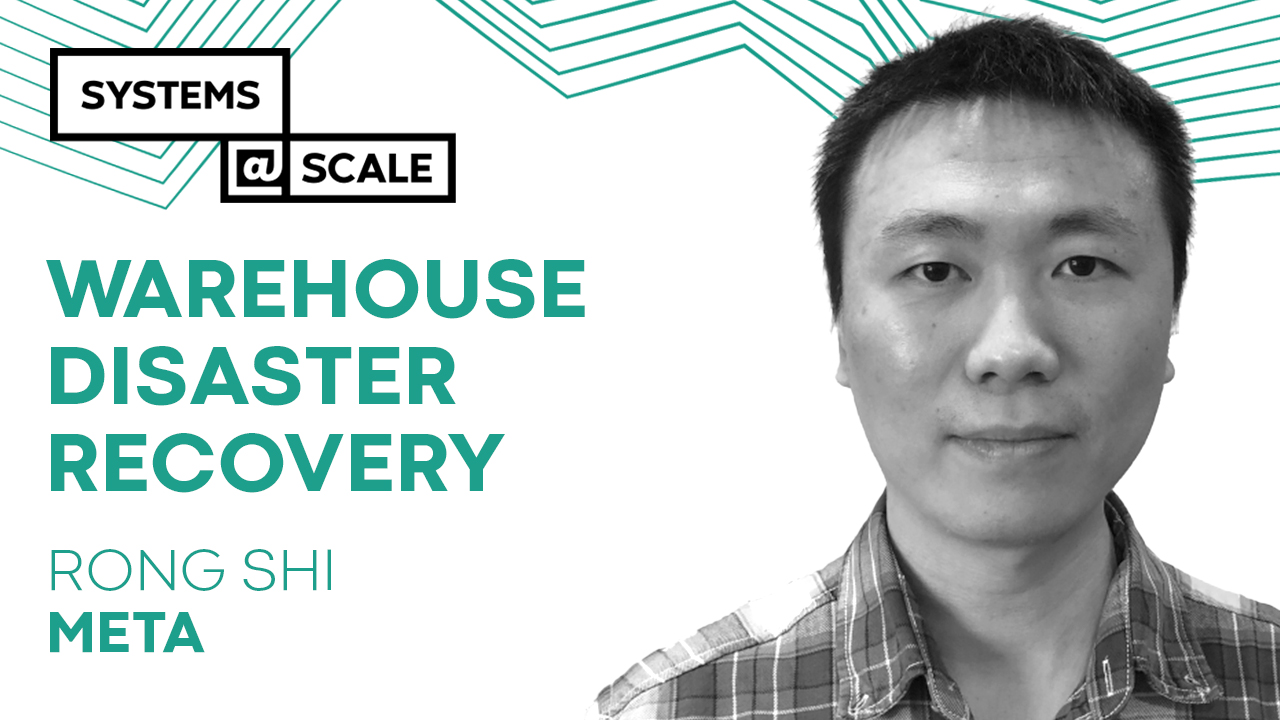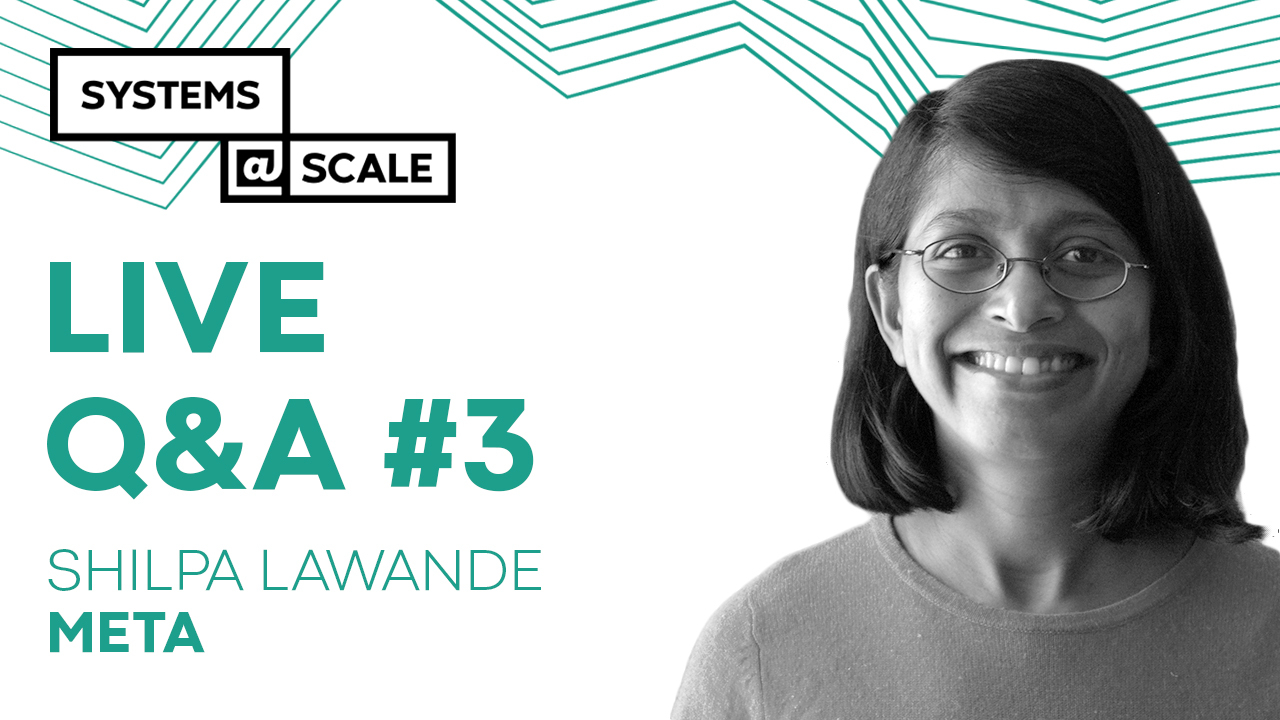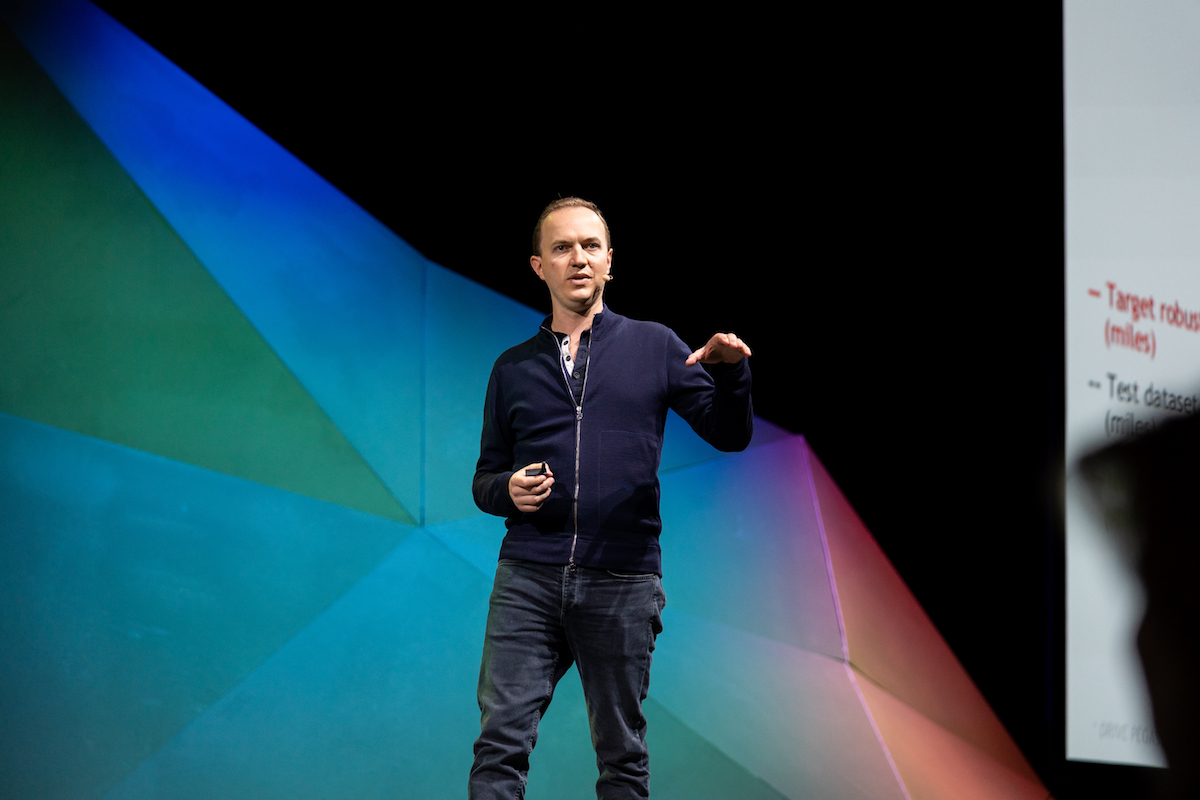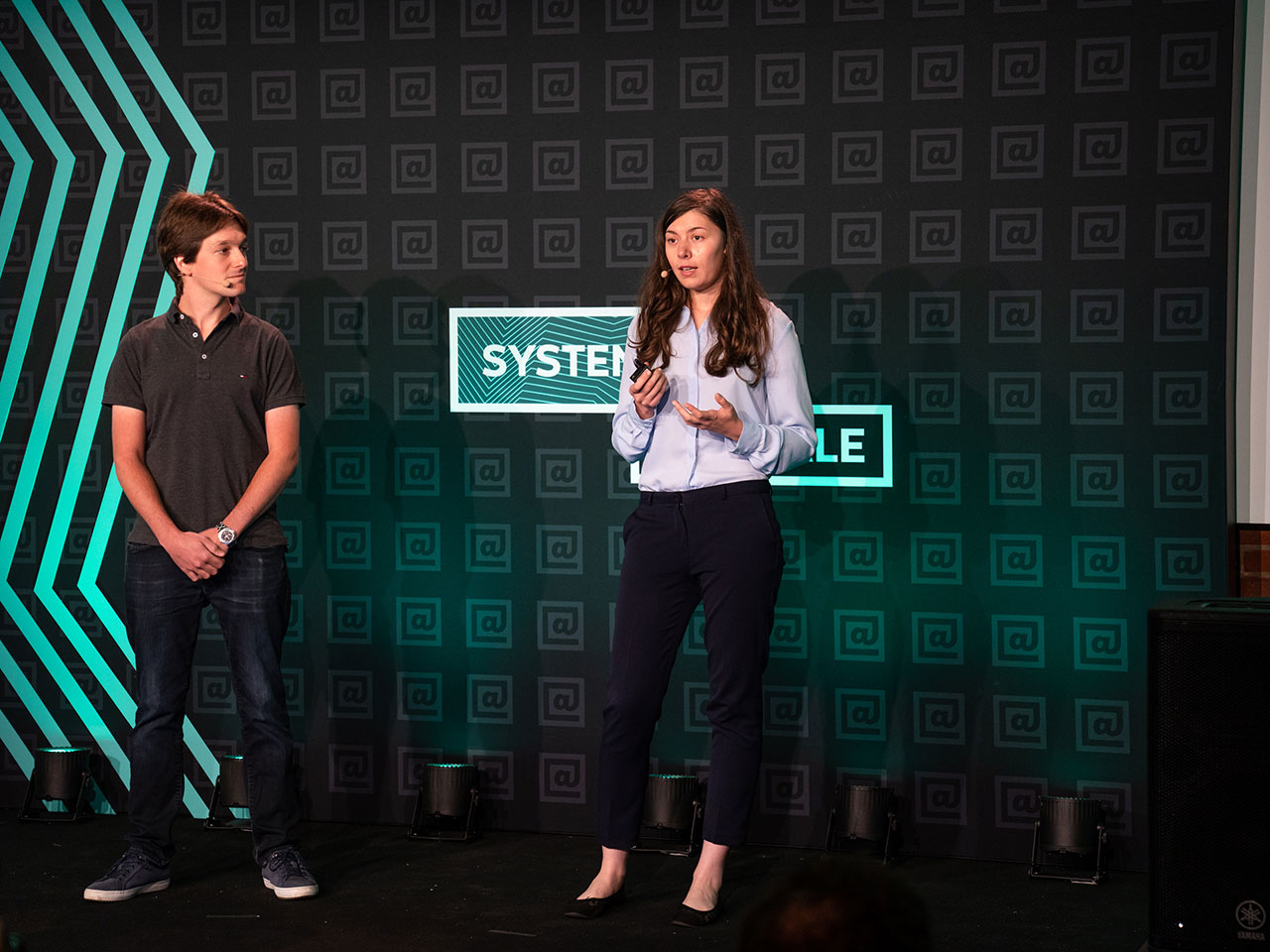- WATCH NOW
- 2025 EVENTS
- PAST EVENTS
- 2024
- 2023
- 2022
- February
- RTC @Scale 2022
- March
- Systems @Scale Spring 2022
- April
- Product @Scale Spring 2022
- May
- Data @Scale Spring 2022
- June
- Systems @Scale Summer 2022
- Networking @Scale Summer 2022
- August
- Reliability @Scale Summer 2022
- September
- AI @Scale 2022
- November
- Networking @Scale Fall 2022
- Video @Scale Fall 2022
- December
- Systems @Scale Winter 2022
- 2021
- 2020
- 2019
- 2018
- 2017
- 2016
- 2015
- Blog & Video Archive
- Speaker Submissions
Systems @Scale Winter 2023
DECEMBER 13, 2023
Designed for engineers that manage large-scale information systems serving millions of people. The operation of large-scale systems often introduces complex, unprecedented engineering challenges.
Register today and check back for upcoming speaker and agenda announcements!

ABOUT EVENT
Systems @Scale Winter 2023 will be hosted virtually. Joining us are speakers from Figma, Google, Meta, Microsoft and Uber. The event will showcase talks themed around three main topic areas: scaling AI platforms, performance and reliability at scale and building systems at planetary scale.
December 13
09:00 AM
-
09:05 AM
Opening Remarks
Session 1: Scaling AI Platforms
09:05 AM
-
09:25 AM
Multi-Tenancy for AI Inference @ Meta Scale
09:25 AM
-
09:45 AM
Automated GPU Sharing at Scale
09:45 AM
-
10:05 AM
Beyond the Buzz: Evolution of AIOps to Improve Reliability at Scale
10:05 AM
-
10:20 AM
Q&A
10:20 AM
-
10:40 AM
Break
Session 2: Building Systems at Planetary Scale
10:40 AM
-
11:00 AM
Conveyor: One-Tool-Fits-All Continuous Software Deployment at Meta
11:00 AM
-
11:20 AM
LiveGraph - Scaling Real-Time Data Access
11:20 AM
-
11:40 AM
Bringing Data to Asynchronous Computing at Scale
11:40 AM
-
12:00 PM
Data Lineage Unleashed: Nitro’s Approach to Automatic Restatements
12:00 PM
-
12:20 PM
Q&A
12:20 PM
-
12:40 PM
Break
Session 3: Performance and Reliability At Scale
12:40 PM
-
01:00 PM
Crane: Uber’s Next-Gen Infrastructure Stack
01:00 PM
-
01:20 PM
Warehouse Disaster Recovery
01:20 PM
-
01:40 PM
Mobile Configuration At Meta
01:40 PM
-
02:00 PM
Q&A
02:00 PM
-
02:05 PM
Closing Remarks
SPEAKERS AND MODERATORS
Biren Damani is an Engineering Manager within the Core Systems Organization at Meta. In... read more
Biren Damani
Meta
Bikash is a software performance engineer at Meta focusing on AI inference efficiency. He... read more
Bikash Sharma
Meta
Leon Yang is a software engineer on the Meta Containers team working on productionizing... read more
Leon Yang
Meta
Ha is a software engineer at Meta, working on GPU inference for Ads ML... read more
Ha Pham
Meta
Zhen Qin is a software engineer on the Meta Ads ML Model Serving team... read more
Zhen Qin
Meta
Xiao Zhang is a senior staff engineer at Google, working on cluster resource management.... read more
Xiao Zhang
Google
Nitin Gupta is an Engineering Manager at Meta. For the past 8 years, he... read more
Nitin Gupta
Meta
Madhura is a Software Engineer at Meta, where she has been working on Monitoring... read more
Madhura Parikh
Meta
Shilpa Lawande is an Engineering Director at Meta, based in Boston. Shilpa’s team builds... read more
Shilpa Lawande
Meta
Eddy is a Software Engineer at Meta, and has worked there for two and... read more
Eddy Li
Meta
Brian is a software engineer at Meta working on Continuous Deployment solutions with an... read more
Brian Fitzpatrick
Meta
Braden works at Figma on LiveGraph, a real-time GraphQL-like system. Before that, he worked... read more
Braden Walker
Figma
Sayak is a software engineer in the Serverless Computing infrastructure team at Meta. Previously,... read more
Sayak Kundu
Meta
Omar Abdou is a Software Engineer on the Core Systems Team at Meta working... read more
Omar Abdou
Meta
Jack is a Partner Architect at Microsoft where he's spent over 16 years working... read more
Jack Pullikottil
Microsoft
Kurtis Nusbaum is a Senior Staff Software Engineer on the Uber Infrastructure team in... read more
Kurtis Nusbaum
Uber
Abhishek Marwah
Meta
Rong Shi has been a research scientist at Meta since 2018. He is in... read more
Rong Shi
Meta
Michael Leighton is a Software engineer in the configuration products platform team at Meta.... read more
Michael Leighton
Meta
EVENT AGENDA
Event times below are displayed in PT.
December 13
December 13
09:00 AM
-
09:05 AM
Opening Remarks

Host
Biren Damani,Meta
Session 1: Scaling AI Platforms
09:05 AM
-
09:25 AM
Multi-Tenancy for AI Inference @ Meta Scale
With the increasingly diverse landscape of AI workloads, it's challenging to build an efficient and reliable infrastructure especially with the emerging powerful and expensive AI accelerators. We identify multi-tenancy as a key strategy to this end. By understanding the characteristics of AI workloads and their supporting hardware, we have an opportunity to optimize workload colocation to achieve significant infra cost savings.

Speaker
Bikash Sharma,Meta

Speaker
Leon Yang,Meta

Speaker
Ha Pham,Meta

Speaker
Zhen Qin,Meta
Featured Blog
MULTI-TENANCY FOR AI INFERENCE AT META SCALE read more
09:25 AM
-
09:45 AM
Automated GPU Sharing at Scale
General-purpose GPUs, with their powerful numerical computing capacity, are popular platforms for accelerating machine-learning workloads. However, GPU workloads often fail to keep the GPU pipeline fully occupied, resulting in low overall resource utilization. To address this inefficiency, we have designed and implemented GPU sharing to improve overall throughput and utilization at cluster level.

Speaker
Xiao Zhang,Google
09:45 AM
-
10:05 AM
Beyond the Buzz: Evolution of AIOps to Improve Reliability at Scale
Operating globally distributed services at Meta scale is no easy feat. In a world with increasing complexity of systems & ever-growing telemetry data, engineers are left looking for a needle in a haystack during high-pressure critical incidents. How can we automate and assist engineers to accelerate root cause analysis and incident mitigation? In this talk we will demystify the industry buzz around AIOps. You will learn about our multi-year journey of embracing AIOps at Meta and leave with a blueprint for improving the reliability of your systems!

Speaker
Nitin Gupta,Meta

Speaker
Madhura Parikh,Meta
Featured Blog
THE EVOLUTION OF AIOPS AT META: BEYOND THE BUZZ read more
10:05 AM
-
10:20 AM
Q&A

Moderator
Shilpa Lawande,Meta

Speaker
Madhura Parikh,Meta

Speaker
Bikash Sharma,Meta

Speaker
Leon Yang,Meta

Speaker
Ha Pham,Meta

Speaker
Zhen Qin,Meta

Speaker
Xiao Zhang,Google

Speaker
Nitin Gupta,Meta
10:20 AM
-
10:40 AM
Break
Session 2: Building Systems at Planetary Scale
10:40 AM
-
11:00 AM
Conveyor: One-Tool-Fits-All Continuous Software Deployment at Meta
This presentation provides an overview of the design, implementation, usage scenarios and statistics of Conveyor, Meta's Continuous Deployment system. Conveyor has been in production since 2015 and performs over 100,000 deployments per week across more than 10,000 services and millions of machines. We provide an analysis of real-world use cases and highlight advanced features necessary for a deployment tool to effectively support all services in the fleet.

Speaker
Eddy Li,Meta

Speaker
Brian Fitzpatrick,Meta
Featured Blog
FORWARD AND BACK AND FORWARD AND BACK: BUILDING CONVEYOR read more
11:00 AM
-
11:20 AM
LiveGraph - Scaling Real-Time Data Access
LiveGraph is a GraphQL-like system that automatically keeps data up-to-date in the UI as changes happen to the underlying data. When it was first built, Figma had 500,000 weekly active users and only a single Postgres instance. Since then, we've scaled LiveGraph to keep up with the growth of Figma. Most recently we’ve built a subscribe-able distributed query cache, this is the story of our journey there.

Speaker
Braden Walker,Figma
11:20 AM
-
11:40 AM
Bringing Data to Asynchronous Computing at Scale
We delve into the details of bridging Asynchronous Computing with Meta’s data streams and the data warehouse, enabling a multitude of use cases at Meta. We share insights into technical challenges faced and the strategies employed to scale our data transport layer to handle trillions of daily jobs across thousands of heterogeneous tenants. The associated learnings hold relevance to high-throughput multi-tenant systems in general.

Speaker
Sayak Kundu,Meta

Speaker
Omar Abdou,Meta
Featured Blog
BRINGING DATA TO ASYNCHRONOUS COMPUTING AT SCALE read more
11:40 AM
-
12:00 PM
Data Lineage Unleashed: Nitro’s Approach to Automatic Restatements
In an era where data is the lifeblood of enterprise innovation and decision-making, understanding and managing complex data lineage has emerged as a critical challenge for data engineers. This talk delves into the intricacies of data flows within modern businesses, where each layer's changes ripple with profound implications for downstream processes. Addressing the pressing need for automatic restatements, we explore the sophisticated mechanisms behind Microsoft's Nitro — a system designed to support data pipeline operations, with robust automatic restatement capabilities. Join us to unravel the complexities of data lineage and discover how cutting-edge systems like Nitro are revolutionizing the way data changes are propagated, ensuring data integrity and agility in fast-paced business environments.

Speaker
Jack Pullikottil,Microsoft
12:00 PM
-
12:20 PM
Q&A

Moderator
Shilpa Lawande,Meta

Speaker
Eddy Li,Meta

Speaker
Brian Fitzpatrick,Meta

Speaker
Braden Walker,Figma

Speaker
Sayak Kundu,Meta

Speaker
Omar Abdou,Meta

Speaker
Jack Pullikottil,Microsoft
12:20 PM
-
12:40 PM
Break
Session 3: Performance and Reliability At Scale
12:40 PM
-
01:00 PM
Crane: Uber’s Next-Gen Infrastructure Stack
Uber has been on a multi-year journey to reimagine our infrastructure stack for a hybrid, multi-cloud world. The internal code name for this project is Crane. In this talk we’ll examine the original motivation behind Crane, requirements we needed to satisfy, and some key features of our implementation. Finally, we’ll wrap up with some forward-looking views for Uber’s infrastructure.

Speaker
Kurtis Nusbaum,Uber
01:00 PM
-
01:20 PM
Warehouse Disaster Recovery
The presentation gives an overview of warehouse disaster recovery (DR). First, it provides context on company-wise DR efforts. Then it gives a quick overview of the data warehouse ecosystem and the importance of warehouse DR efforts. Later, it provides warehouse DR design and recent improvement for batch workload recovery.

Speaker
Abhishek Marwah,Meta

Speaker
Rong Shi,Meta
Featured Blog
WAREHOUSE DISASTER RECOVERY: BATCH-WORKLOAD RECOVERY AT SCALE read more
01:20 PM
-
01:40 PM
Mobile Configuration At Meta
MobileConfig is Meta's internal tool for the authoring and distributing configuration values across its many mobile apps and platforms, including Facebook, Instagram, and Oculus. Using MobileConfig, a developer can make a configuration change in minutes and have it distributed quickly and reliably to the billions of users who use our apps. Developers use the system to safely roll out mobile features, configure our many apps, and perform experimentation. We also provide a set of tools that give developers insights into the rollout of config values and allow rapid deployment of configuration values in emergencies. In this presentation, we will discuss some core features of MobileConfig, including our consistency model, performance optimizations, and how mobile configuration can push mobile agile software development to the extreme.

Speaker
Michael Leighton,Meta
Featured Blog
MOBILE CONFIGURATION AT META: THE KEY TO MOBILE AGILE DEVELOPMENT AT SCALE read more
01:40 PM
-
02:00 PM
Q&A

Moderator
Shilpa Lawande,Meta

Speaker
Kurtis Nusbaum,Uber

Speaker
Abhishek Marwah,Meta

Speaker
Rong Shi,Meta

Speaker
Michael Leighton,Meta
02:00 PM
-
02:05 PM
Closing Remarks

Host
Biren Damani,Meta
LATEST NOTES
Systems & Reliability @Scale
12/13/2023
Multi-Tenancy for AI Inference at Meta Scale
Introduction: AI inference at Meta At Meta, AI workloads are pervasive across a wide range of products. Some of those...
Systems & Reliability @Scale
12/13/2023
The Evolution of AIOps at Meta: Beyond the Buzz
Meta runs thousands of services across millions of servers and multiple data centers throughout the world. Operating such distributed systems...
Systems & Reliability @Scale
12/13/2023
Forward and Back and Forward and Back: Building Conveyor
Additional author: Boris Grubic Think of how you push new releases of anything, whether at work or on some other...
Systems & Reliability @Scale
12/13/2023
Bringing Data to Asynchronous Computing at Scale
Asynchronous computing and data processing are building blocks in the modern cloud. The Async Tier is Meta’s platform for serverless...
Systems & Reliability @Scale
12/13/2023
Warehouse Disaster Recovery: Batch-Workload Recovery at Scale
Site-wide outages (e.g., network or power outages) would cause huge costs in terms of lost revenue and damage to Meta’s...
Systems & Reliability @Scale
12/13/2023
Mobile Configuration at Meta: The Key to Mobile Agile Development at Scale
Additional authors: Amit Adhikari, Tong Bao, Diedi Hu, Matt Guo, Zhao Wang, and Arjun Bhasin Intro to MobileConfig MobileConfig is...









